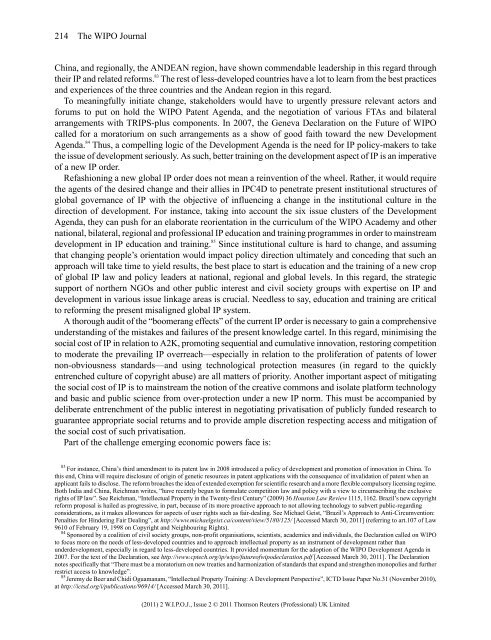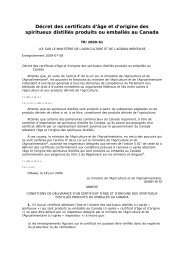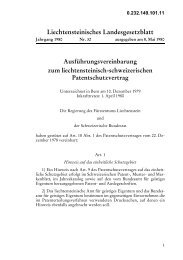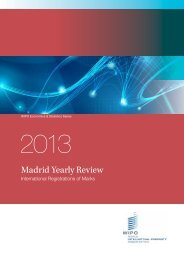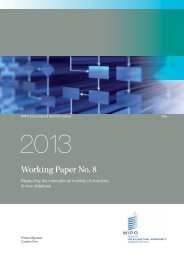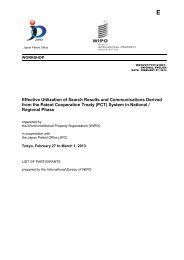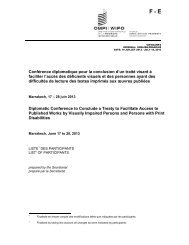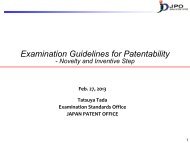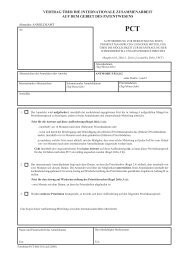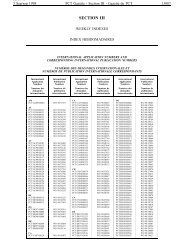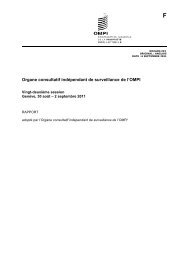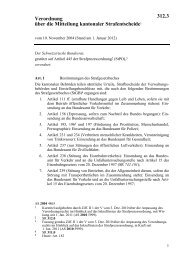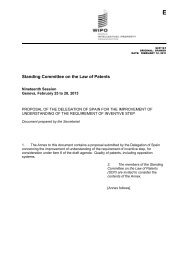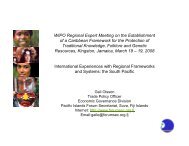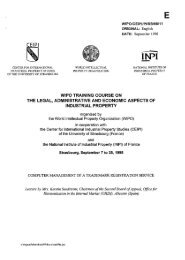WIPO Journal - World Intellectual Property Organization
WIPO Journal - World Intellectual Property Organization
WIPO Journal - World Intellectual Property Organization
Create successful ePaper yourself
Turn your PDF publications into a flip-book with our unique Google optimized e-Paper software.
214 The <strong>WIPO</strong> <strong>Journal</strong><br />
China, and regionally, the ANDEAN region, have shown commendable leadership in this regard through<br />
their IP and related reforms. 83 The rest of less-developed countries have a lot to learn from the best practices<br />
and experiences of the three countries and the Andean region in this regard.<br />
To meaningfully initiate change, stakeholders would have to urgently pressure relevant actors and<br />
forums to put on hold the <strong>WIPO</strong> Patent Agenda, and the negotiation of various FTAs and bilateral<br />
arrangements with TRIPS-plus components. In 2007, the Geneva Declaration on the Future of <strong>WIPO</strong><br />
called for a moratorium on such arrangements as a show of good faith toward the new Development<br />
Agenda. 84 Thus, a compelling logic of the Development Agenda is the need for IP policy-makers to take<br />
the issue of development seriously. As such, better training on the development aspect of IP is an imperative<br />
of a new IP order.<br />
Refashioning a new global IP order does not mean a reinvention of the wheel. Rather, it would require<br />
the agents of the desired change and their allies in IPC4D to penetrate present institutional structures of<br />
global governance of IP with the objective of influencing a change in the institutional culture in the<br />
direction of development. For instance, taking into account the six issue clusters of the Development<br />
Agenda, they can push for an elaborate reorientation in the curriculum of the <strong>WIPO</strong> Academy and other<br />
national, bilateral, regional and professional IP education and training programmes in order to mainstream<br />
development in IP education and training. 85 Since institutional culture is hard to change, and assuming<br />
that changing people’s orientation would impact policy direction ultimately and conceding that such an<br />
approach will take time to yield results, the best place to start is education and the training of a new crop<br />
of global IP law and policy leaders at national, regional and global levels. In this regard, the strategic<br />
support of northern NGOs and other public interest and civil society groups with expertise on IP and<br />
development in various issue linkage areas is crucial. Needless to say, education and training are critical<br />
to reforming the present misaligned global IP system.<br />
A thorough audit of the “boomerang effects” of the current IP order is necessary to gain a comprehensive<br />
understanding of the mistakes and failures of the present knowledge cartel. In this regard, minimising the<br />
social cost of IP in relation to A2K, promoting sequential and cumulative innovation, restoring competition<br />
to moderate the prevailing IP overreach—especially in relation to the proliferation of patents of lower<br />
non-obviousness standards—and using technological protection measures (in regard to the quickly<br />
entrenched culture of copyright abuse) are all matters of priority. Another important aspect of mitigating<br />
the social cost of IP is to mainstream the notion of the creative commons and isolate platform technology<br />
and basic and public science from over-protection under a new IP norm. This must be accompanied by<br />
deliberate entrenchment of the public interest in negotiating privatisation of publicly funded research to<br />
guarantee appropriate social returns and to provide ample discretion respecting access and mitigation of<br />
the social cost of such privatisation.<br />
Part of the challenge emerging economic powers face is:<br />
83 For instance, China’s third amendment to its patent law in 2008 introduced a policy of development and promotion of innovation in China. To<br />
this end, China will require disclosure of origin of genetic resources in patent applications with the consequence of invalidation of patent when an<br />
applicant fails to disclose. The reform broaches the idea of extended exemption for scientific research and a more flexible compulsory licensing regime.<br />
Both India and China, Reichman writes, “have recently begun to formulate competition law and policy with a view to circumscribing the exclusive<br />
rights of IP law”. See Reichman, “<strong>Intellectual</strong> <strong>Property</strong> in the Twenty-first Century” (2009) 36 Houston Law Review 1115, 1162. Brazil’s new copyright<br />
reform proposal is hailed as progressive, in part, because of its more proactive approach to not allowing technology to subvert public-regarding<br />
considerations, as it makes allowances for aspects of user rights such as fair-dealing. See Michael Geist, “Brazil’s Approach to Anti-Circumvention:<br />
Penalties for Hindering Fair Dealing”, at http://www.michaelgeist.ca/content/view/5180/125/ [Accessed March 30, 2011] (referring to art.107 of Law<br />
9610 of February 19, 1998 on Copyright and Neighbouring Rights).<br />
84 Sponsored by a coalition of civil society groups, non-profit organisations, scientists, academics and individuals, the Declaration called on <strong>WIPO</strong><br />
to focus more on the needs of less-developed countries and to approach intellectual property as an instrument of development rather than<br />
underdevelopment, especially in regard to less-developed countries. It provided momentum for the adoption of the <strong>WIPO</strong> Development Agenda in<br />
2007. For the text of the Declaration, see http://www.cptech.org/ip/wipo/futureofwipodeclaration.pdf [Accessed March 30, 2011]. The Declaration<br />
notes specifically that “There must be a moratorium on new treaties and harmonization of standards that expand and strengthen monopolies and further<br />
restrict access to knowledge”.<br />
85 Jeremy de Beer and Chidi Oguamanam, “<strong>Intellectual</strong> <strong>Property</strong> Training: A Development Perspective”, ICTD Issue Paper No.31 (November 2010),<br />
at http://ictsd.org/i/publications/96914/ [Accessed March 30, 2011].<br />
(2011) 2 W.I.P.O.J., Issue 2 © 2011 Thomson Reuters (Professional) UK Limited


